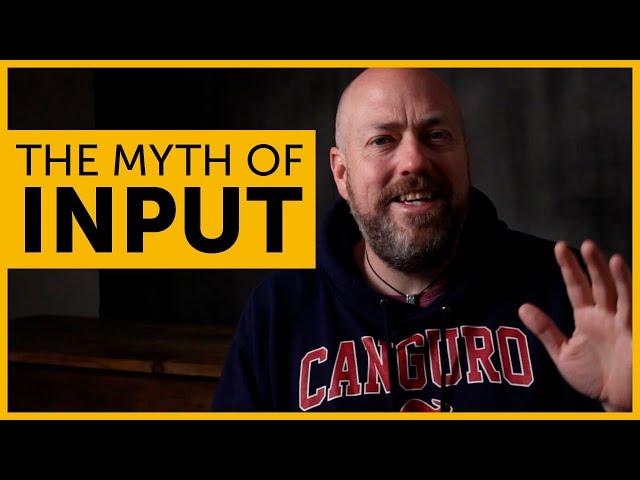
The myth of input | How NOT to learn a language
Комментарии:

I learned English by watching episodes and their re-runs of Dragon Ball Z and Naruto in English. One day, as crazy as it sounds, I woke up to episodes suddenly understanding what they were talking about.
Ответить
I really injoied your clear accent, trying understand English serieses and movies are my top target, I did some progress but not enough .
I hope to find the correct way to achaive my goals

Language acquisition is a funny thing. I think lots of input can work wonders sometimes but other times it doesn’t seem to do anything and you need to try something else. But it’s refreshing to see someone challenging the input hypothesis.
Ответить
The essence of Input is that you are not learning a language, but learning something interesting to you - using the language as a tool. and this is how my children are taught at school, they do not learn English, but learn mathematics in English. and as a result, they are weak in mathematics but strong in English :)
Ответить
I don’t think people who advocate for CI say that you shouldn’t output.
Ответить
I learnt 10 languages by (mainly) the comprehensible input method and I have been using this method with my students with amazing results for YEARS. Every real polyglot will contradict you. And comprehensible input does not exclude speaking and doing language drills too. This video is a huge disappointment and the comments show that your audience knows much more than you about this.
Ответить
I learned 2 langages since I learned about comprehensible input and and I am studying 2 others and those are languages I struggled with during 20 years on and off .And it s coming easily.
Ответить
You. Are. Full. Of. Shit! I have a job where I sit on my arse and do nothing for 10 hours a day, 5 days a week! I’m 30 years old and decided I wanted to learn Spanish. I learned the language SOLEY through watching every episode of the Simpson in Spanish on Disney+ without subtitles. Was a strange experience.
At the start it sounded like gobbledygook, then I started to hear separate words and sentence structure, but still didn’t know what it meant. Then after about 10 seasons I’d start to know what a character was saying, I couldn’t have written it down, or break down the sentence I.e “this means that, and this means that” but I just knew what thoughts, feelings and information they was trying to get across. Kept going every night, again and again and again episode after episode and now I understand everything completely

Input is vital, but you also need output.
Ответить
I love it. It's so true. Thanks, Christian!
Ответить
im doing my first steps in learning languages and see this at this moment has been extremely important for my further self learning. so thanks a lot for sharing.
Ответить
As a child of immigrants, I totally disagree with you on that analogy. For example, many of my friends had parents who spoke Chinese at home AND attended Chinese school on weekends have never retained it. This is because they were disinterested in what their parents and teachers said. When they grew up, they "regretted" not paying attention to their elders.
They DID have formal classroom instruction. The problem is that they were disinterested in it all. In other words, their brain was disengaged from it.
Meanwhile, I have other friends whose parents spoke English at home and didn't attend Chinese school. They had limited Chinese exposure from family, but they were genuinely into Chinese music and Chinese films as children, and made friends with kids who were born in Asia. The times they listened to Chinese being spoken was when they were playing – activities they were cognitively and willingly engaged in. Their Chinese ability is better than most people who spoke it at home.
Input must be engaging. That is the key difference. Most of these online language learners using input are consuming entertaining media – not listening to parents. HUGE DIFFERENCE. With that said, we all acknowledge that input alone is inadequate and must be accompanied with tedious studying and awkward conversation, but it is important and effective nonetheless.
Please learn more about immigrant language retention before you use a false analogy.

I feel sorry for anyone that listens to this guy 😂😂. You will end up wasting so much time and you won't get anywhere.
Ответить
You are an idiot🎉
Ответить
What I take away from this video is the fact that it's not functional to isolate a single skill when acquiring a language. However, I consider that input, whether heard or read, is important to set the parameters of what is expected when you produce the language orally or in writing.
Ответить
Brain surgery - the perfect explanation!
Ответить
Can you all relax? He's just saying you should put in practice everything that you're learning, he's not rejecting learning altogether. He literally said to not take it to extremes with comprehensible input and practice speaking as well, because that's your ultimate goal in the language.
Ответить
I feel sad for anyone who listens to this advice.
Ответить
Well...I can tell you that as an argentinian spanish speaker, I went to the US when I was 12 years old and the state of SC put me in seventh grade with the rest of the kids in a public school. I never had a special teacher of any sort...my learning was fully done through listening for the first 4 months, after the summer break I started 8th grade as a regular student and passed all my subjects, never had a problem...I've never studied grammar or vocab.
So, it seems like you've never experienced this process...
Im an english teacher now, specializing in sound recognition...I could teach you a thing or two

I am retired psychologist, and I can tell neuropsychology disagree with you.
Ответить
As someone who is nearly native fluent in Spanish from simply using Dreaming Spanish and watching tons of Spanish TV... It works. Comprehensible input + conversational practice once you get to a certain degree works far superior to just grinding out textbooks. Almost everyone I know who learned Spanish or English has done it via CI.
Ответить
I learned English that way (acquisition)and now I am learning another language. And of course, I am feeling my progress . Traditional way of learning is boring and discouraging.
Ответить
Sad that you seen no value in something obviously has been affective for many people.
Ответить
I don't think that Stephen Krashen claims that people shouldn't produce any output. He focuses on input for improvement. But it's pretty clear that if you don't speak the language, you will not be able to speak it. Simply from a muscle memory perspective. If Krashen claims that, then it's a little strange. But I think the model is more complex than that.
Ответить
hmmm I have some questions.
I'm not a native speaker but still I teach people how to speak a language. I'm deeply disappointed with the classical academic approach and I really do my best to teach people only real useful things paying attention to missing things such as the spelling technique, meaning phonetics, which I try to clarify in all the tiniest details with the simplest kinda words.
And so, recently I've learned about "comprehensible input". I should say at once that I didn't find anything confusing while watching that legendary record of Krashen. But now...
Would I be right if I say that this method isn't good in your opinion because the idea of only taking in or soaking a language scandalizes you?
But isn't this a theory about understanding but not using? It's all exactly about vocabulary, no?
If I get everything right and input is a vocab thing, then what's wrong with it? Why not ease at least this point in the list of necessary to obtain things when you study?
Look we have a lot of obstacles your people've made. like... for instance how to understand all that ridiculous stuff such as connected speech and how strong it affects lack of understanding and total confusion as a result. Or the complete absence of any hint of logic when we realize the conflict between spelling and pronunciation. This shht I mean, which is a neverending constant frustration for every single esl learner I dare say.
In addition to the things I've mentioned vocab is an essential part of learning any language. How could I use on practice freshly learned rule if I have no words to build a sentence to use this rule, right?
So I've made a conclusion this input thing is about getting vocab the easiest way possible: look at the picture, see the word underneath, listen to how it's supposed to sound, and remember faster via saving not just word and sound in your memory, which is pretty challenging for the most, but support those with an image in your mind. Then, as I understand, having some base of words we learn grammar and stuff like shadowing, speaking, and so on. And after a while, we finally achieve noticeable results - we speak, we get what we hear, we understand and are understood. Thus I thought Krashen's theory was true.
But after your video, where I didn't get at all why you are blaming this theory that looks quite true, I started feeling some doubts... you know I was wondering how to stick in the "input" in my lessons... but then you pop out with this complete disrespect of the method... and at the same, you never tried to sell me shht in your vids...
So, Christian, come and help us to figure this stuff out, please😄

Wow, you couldn't be more wrong.
Ответить
As a professor with over 20 years of experience in English, I firmly advocate for input-based language learning. It's the most effective and, in my view, the primary method for true language acquisition. Language acquisition, as proposed by Crashen & Allis (1994), relies on comprehensible input, just slightly beyond the learner's current proficiency level.
I can illustrate this with the case of my 15-year-old Brazilian student who learned English solely by watching "Friends" repeatedly. Through extensive exposure to comprehensible and enjoyable language input, her brain naturally processed and internalized the language patterns, resulting in her speaking General American English fluently with a flawless accent, all without formal courses or going abroad.
Several reasons support the effectiveness of input-based learning:
It mirrors the natural process of acquiring one's first language.
It enables the practice of all four language skills: listening, speaking, reading, and writing.
Its enjoyable and motivating nature encourages long-term commitment.
It's accessible to learners at all levels, from beginners to advanced.
If you're committed to language learning, I highly recommend embracing input-based learning. It's the surest path to achieving your language fluency goals.

«trying to SELL them to you» which is the way to know whether you can trust someone or not. Comprehensible Input is a complete LIE! How can you take seriously, anyone, who comes from a monolingual culture and presents themselves as an expert with a New Method! It´s got all the snake oil signuratures and men today are very stupid! How can you understand what you can't understand? Ah! I see her pointing at an Apple. She must be hungry! Hungry...Manaza! Brilliant. How do you know any depth of intensity or formality from a drawing board. YEA! I understood that Comprensible Input! YEA! I must be learning. Yes, you´re learning...nothing. It´s the biggest lie, the biggest scam and now, I enjoying laughing at stupid people. I made myself fluent in 27 months over 10,000 hours. I know what it takes and what is a complete waste of time. Thank you Canguro for being honest and accurate.
Ответить
You can't practice if you haven't received enough input.
Ответить
He is just standind for what he believes: a more deep dive into learning...it means to get in touch with the richness of learning-acquiring a language. Just speak is ok but not enough...it's the reason why we have to learn to write and read in our own languages...these part of a deep core of a language.
Nobody needs to be disrespectful the Christians point of view.

Nah, plain and simple, input works
Ответить
As a guy who is not native english speaker and learned english through watching gaming videos I'm strongly agree with you lol
Ответить
Nothing has trained my ear, given me everyday usage, or taught me to better intuit grammar use than comprehensible input. It’s not for everyone, but this guy makes language seem like a bummer and it’s not..
Ответить
That brain surgery analogy was SO bad. Holy hell.
Also side note, he's so arrogant

fundamental lack of understanding of the Input Hypothesis and its place
Ответить
So basically, his argument is as follows:
R1: Comprehensible input doesn't let you practice to get good.
R2: Input alone isn't the entire process. You have to practice it. Mr. Steven's hypothesis just lets you receive info and no processing happens there so you don't use it.
R3: Comprehensible input only helps you know a language, but not to perform higher level tasks like speaking
R4: It's cold because it doesn't cause people to share ideas by talking, writing, etc.
Conclusion: COMPREHENSIBLE INPUT is overrated.
Your argument all depends on a single line of reasoning so if one reason is wrong, everything built on it falls apart.
COMPREHENSIBLE INPUT basically means look for sources of info where you can clearly understand the message behind what is being said (tone of voice, body language, etc.)
●R1 = Honestly, as a human being, you only continuously practice something you see their value, you're interested in, and there seems to be a way to get it. I'm not going to master Spanish from reading 300 word novels with no hint of the message. I don't see the value of translating every line that i I don't understand, going to dictionary/book, then retrying it to see if i know what's been written. I have still missed the "message". Therefore R1 is not necessarily true. That already the entire argument's point is void but lemme continue so everything sees the flow.
● R2 = There's a system behind learning here. You to get the info (your senses), and make meaningful connections among the info so you can better store and retrieve it as needed. Thus whatever doesn't promote that is meaningless. However Mr. Steven talks about COMPREHENSIBLE INPUT, not just any input. As long as the "message" is clear, it doesn't matter what has been said/written. If i stare at you angrily, point at you, grab a knife and run towards you, whether i say "I'm gonna kill you/ i love you" doesn't matter. You understand what's about to go down. Thus when you take in info in a way where the message can clearly be understood, of course you're going to understand it, make meaningful connections and remember it (depends on how intense the message is for you tho but to simplify stuff, let's assume the message matters to you). Thus the fact that you thought it is just passively taking in information just shows how badly you misunderstand COMPREHENSIBLE INPUT. Thus R2 is false as well.
● R3 = As I already said, if you get the message, you will know and understand it. No proper COMPREHENSIBLE INPUT supporter said that you don't need to practice. It's just less practice is needed to remember something in which the message. And the practice seems pleasant. If the practice is too long and hurts as hell, so or later, you'll either stop trying or break down in your effort to push on. Either way, the practice has still ended. So R3 is always wrong following from R2
●《R4 = People share what they're emotional or passionate about. If i watch funny memes in Spanish where i get what's going on, (else i wouldn't see the humor in it😂😂) I'll share it with someone as well. You don't share what you're not interested in or don't understand. If people are interested in something, they look for people with similar mindsets and interests to form communities, and there the entire community learns subconsciously. So the only thing cold here is YOU towards learning more about COMPREHENSIBLE INPUT.
My conclusion: Sure, a lot of people can pass on misconceptions about info. I'm sure you don't too. But it's sad how you yourself passed on misconceptions about an excellent method in an attempt to clear misconceptions💀😭😭...Remember that the whole point of language is share a "message", it's how it's done that differs. If you don't get the message, what's the point? Indeed, there is only one way to learn a language: receive the targeted info where you get the message, so you will gradually subconsciously express it in that way too.

This video lacks SO MUCH genuine reasoning as to be embarrassing. The hypotheticals are just lazy and ill-conceived as they ignore the individual's desire, intention and motive. The parasite analogy is not only erroneous, but stupid. A child of immigrants may not learn their parents language perhaps because of the complete lack of meaningful desire, motive or INTENTION. The old country language has no genuine currency in their new life or new world, and therefore it falls to the wayside.
The presenter here only reasons to the limit and ludicrously shallow depth of his hypothesis and no further. He presents this as an "either/or" scenario that the only way one would use CI is to "acquire" a language and yet not speak it. Ludicrous! It becomes obvious to anyone who has actually used CI to acquire a language, that the presenter has not truly investigated it in any serious way.
The process of "acquiring" a language is far more complicated than he portrays. The desire, motive, and intention of an individual literally lay at the core of this (or any) language acquiring process. These factors are the fuel sources that provide an individual with the needed focus and concentration to comprehend what they are hearing or reading. This is literally the method of how we ALL learned our own native tongue. Speaking comes naturally as you comprehend more and more of a language. A child usually becomes fluent by the age of 6, yet adults using this method can accelerate the process to 2 or 3 years.

Saying and believing that tons of comprehensible input will do nothing for your ability to communicate, speak or use the language you're learning simply demonstrates how little Canguro knows about this strategy at a personal level. Think of your language ability as a plant. A plant needs water and sunlight to grow. It doesn't need anything different in order to bring forth fruit. The fruit is the natural result of so much watet, earth and sunlight "INPUT". Exposure is not just about refining your listening and reading (?) I mean it is, but your entire language abilities benefit from it.
Ответить
The arguments in this video are so poorly elaborated and knit together... even the ending is so confusing. A theory that has actually been shown to be effective (even in my case) "... robs me of the gift of language... which is about understanding... myself...??"
Ответить
Hmm... I don't think what I did as a child was practicing Spanish. Nope, I just listened. And then I talked. Just talked, as good as I could, but I talked.
Ответить
Errors correct themselves. How? Surprise, through more exposure! INPUT.
Ответить
Um, Canguro, you know at School we have English for almost 12 years in my country. We do tons of speaking and writing. We even have speaking tests. Almost 100% leaves school not being able to produce a single well articulated sentence, let alone have a conversation. But you know what? When we spend some time having fun or doing something interesting or listening to something compelling in English, we end up picking it up... Hmm...
Ответить
Let me go ahead and burst your bubble. I'm from Argentina and I've never been to the UK or any other English-speaking country in my life. I began learning English seriously around 2018 and for more than three years I just watched content in English that I more or less understood and enjoyed, including of course good ESL teaching channels like Amigos Ingleses. I don't remember anyone telling me that I should practice speaking a lot, and I was fine with it most of the time. What I found really helped me was watching British English films and content (including podcasts) with almost no pressure at all on learning. While watching those films however, I did notice certain patterns, accents and new words, including slang. But I didn't sit there and write them in order to practice them later. However, what I instinctively did was watch and listen to the moment the new word appeared several times... Now, I can remember them and use them virtually perfectly to this day, even rare Geordie words like divvy. It's true, I had to look up some of those words. But context generally does the job (it doesn't teach you but it helps you guess, and quite well).
The first time I ever talked to a native was about a few months ago on chatroulette (after years of acquiring [forming a mental image of what the language looks like] and being exposed to tons of English. Can you believe my first time ever talking to a native went perfectly well? I mean perfectly well, almost never having to grasp for words.
Today, not only have I got a certified C2 level of English and can speak it with anyone from anywhere, but some people actually say I sound like I was born in Britain!
So to me, yes, Comprehensible Input WORKS.
However, in my journey I used to do something weird that maybe other people do, and I have to mention it. I did sometimes speak TO MYSELF. Not to practice, but it just came naturally. I don't know how helpful it can be to speak to yourself, but well... That was something.

I started writing rap music at 13. Rap music is my favorite music. Thru comprehensive input I took rap lyrics of my favorite artist and translated them into Spanish from English. Hearing music, stories and material I already knew in my target language definitely helped to learn words faster.
However I do suggest getting a friend to speak with at least twice a week.

You can of course disagree with someone , but u never have the excuse to be disrespected
Ответить



















